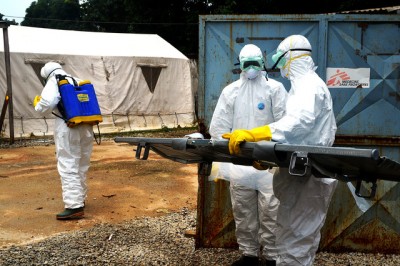There could be 1.4 million cases of Ebola by January in just two West African Nations, Liberia and Sierra Leone, according to new projections from the Centers for Disease Control and Prevention (CDC).
The CDC report based the estimate on new research that shows Ebola could be deadlier and spreading faster than previously thought.
“The findings in this report underscore the substantial public health challenges posed by the predicted number of future Ebola cases,” the CDC said. “If conditions continue without scale-up of interventions, cases will continue to double approximately every 20 days, and the number of cases in West Africa will rapidly reach extraordinary levels.”
If the CDC is correct, then there also would be more than 1 million deaths from Ebola by late January, as the fatality rate is 71 percent.
The figure of 1.4 million is the CDC’s worst-case scenario for the Ebola outbreak, and is far more than an estimate published in the journal Eurosurveillance earlier in September. That article predicted there would be 277,000 cases of Ebola in all of West Africa by the end of 2014.
Perhaps most frightening, the CDC’s figures are nearly triple what they were just four days earlier. On Friday, the CDC said the worst-case scenario was 500,000 cases by the end of January. On Tuesday, it had placed it at 1.4 million.
The Hidden Secrets Of Making Herbal Medicines…Right At Your Fingertips!
(Listen to Off The Grid Radio’s in-depth report, How To Survive The Imminent Ebola Pandemic.)
Ebola Outbreak Unprecedented
Scientists say this is the worst Ebola outbreak ever. Even the World Health Organization (WHO) is having a hard time coping with the situation. An article in The New England Journal of Medicine by two of the organization’s experts summed up the situation this way:
“The 25th known outbreak of Ebola virus infection is unlike any of the previous epidemics,” Professor Jeremy Farrar, MD, and Peter Piot, MD, wrote. “It has already killed over 2,800 people — more than all previous epidemics combined; it’s affecting virtually the entire territory of three countries, involving rural areas, major urban centers, and capital cities; it has been going on for almost a year; and it is occurring in West Africa, where no Ebola outbreak had previously occurred.”
The CDC and WHO also reported:
- The Ebola outbreak in Liberia began with just nine infected people.
- The outbreak in Sierra Leone began with just 30 cases.
- The death rate for Ebola victims admitted to hospitals is 64.3 percent – a number that is different from the death rate (71 percent) when including people who don’t enter the hospital.
- There were 5,864 cases of Ebola in West Africa and 2,811 deaths from the virus as of Sept. 21.
More than 100 Ebola victims were buried at just one cemetery in eight days in Freetown, Sierra Leone, The New York Times reported. “We will need much more space,” gravedigger James C.O. Hamilton told The Times.
The Ebola outbreak could spark civil unrest and civil war, Farrar and Piot predicted.
“Indeed, there is a very real danger of a complete breakdown in civic society, as desperate communities understandably lose faith in the established systems,” they wrote.
World’s Smallest Solar Generator … Priced So Low Anyone Can Afford It!
The Ebola pandemic could greatly increase the number of deaths from other causes such as AIDS, cancer and tuberculosis because it will destroy the public health system, the men said. Many of those catching Ebola in Africa are doctors, nurses and other caregivers exposed to body fluids from Ebola patients.
“Classic ‘outbreak control’ efforts are no longer sufficient for an epidemic of this size,” Farrar and Piot said.
The world is not prepared to deal with future pandemics, the men said.
“There will be more epidemics and outbreaks of Ebola and other new or reemerging infections,” Farrar and Piot wrote. “Yet our response to such events remains slow, cumbersome, poorly funded, conservative, and ill prepared.”
Do you believe the Ebola outbreak is a legitimate threat to the world? Leave your reply in the section below:
